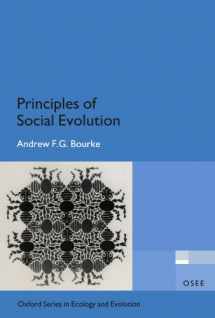
Principles of Social Evolution (Oxford Series in Ecology and Evolution)
Book details
Summary
Description
Living things are organized in a hierarchy of levels. Genes group together in cells, cells group together in organisms, and organisms group together in societies. Even different species form mutualistic partnerships. Throughout the history of life, previously independent units have formed groups that, in time, have come to resemble individuals in their own right. Evolutionary biologists term such events "the major transitions". The process common to them all is social evolution. Each transition occurs only if natural selection favors one unit joining with another in a new kind of group. This book presents a fresh synthesis of the principles of social evolution that underlie the major transitions, explaining how the basic theory underpinning social evolution - inclusive fitness theory - is central to understanding each event. The book defines the key stages in a major transition, then highlights the shared principles operating at each stage across the transitions as a whole. It addresses in new ways the question of how, once they have arisen, organisms and societies become more individualistic.


We would LOVE it if you could help us and other readers by reviewing the book
Book review



